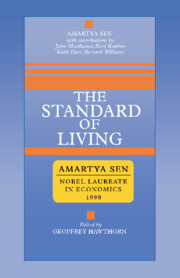Book contents
- Frontmatter
- Contents
- List of contributors
- Introduction
- The Standard of Living: Lecture I, Concepts and Critiques
- The Standard of Living: Lecture II, Lives and Capabilities
- Professor Sen on the Standard of Living
- The Standard of Living: Uncertainty, Inequality and Opportunity
- Commoditisation and the Standard of Living
- The Standard of Living: Interests and Capabilities
- Reply
- Bibliography
- Index
Professor Sen on the Standard of Living
Published online by Cambridge University Press: 23 December 2009
- Frontmatter
- Contents
- List of contributors
- Introduction
- The Standard of Living: Lecture I, Concepts and Critiques
- The Standard of Living: Lecture II, Lives and Capabilities
- Professor Sen on the Standard of Living
- The Standard of Living: Uncertainty, Inequality and Opportunity
- Commoditisation and the Standard of Living
- The Standard of Living: Interests and Capabilities
- Reply
- Bibliography
- Index
Summary
INTRODUCTION
It is a great honour to be asked to contribute to the discussion of Professor Sen's lectures on ‘The Standard of Living’. The fact that I very largely agree with Sen's viewpoint made me wonder at first about how much scope there was for discussion. However, the subject is at the heart of economics and both Sen's analysis and his own applications have been so fruitful that the problem became one of where to end, not of where to begin.
Let me summarise at the risk of gross oversimplification what I see as Sen's essential points for a practising economist. Standard of living comparisons have traditionally been attempts to summarise a basket of commodities relative to a different basket in terms of a single ratio. For example, basket A is x% better (‘more opulent’) than basket B. This is what Sen characterises as the ‘opulence’ view of the standard of living. Making several traditional simplifying assumptions, including an unchanged utility function, the opulence view is equivalent to a utility or satisfaction view of the standard of living.
Sen argues that really there is much more to the standard of living than that and questions both the opulence and the utility views. He argues that the links between goods and utility or satisfaction are quite complicated and that several distinctions are crucial to understanding it. I hope my schematic representation of these links in Figure 1 does not misrepresent his views.
- Type
- Chapter
- Information
- Tanner Lectures in Human ValuesThe Standard of Living, pp. 39 - 58Publisher: Cambridge University PressPrint publication year: 1987
- 26
- Cited by



